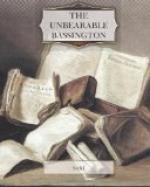“You are a person to be envied,” she said to Keriway; “you have created a fairyland, and you are living in it yourself.”
“Envied?”
He shot the question out with sudden bitterness. She looked down and saw the wistful misery that had come into his face.
“Once,” he said to her, “in a German paper I read a short story about a tame crippled crane that lived in the park of some small town. I forget what happened in the story, but there was one line that I shall always remember: ’it was lame, that is why it was tame.’”
He had created a fairyland, but assuredly he was not living in it.
CHAPTER IX
In the warmth of a late June morning the long shaded stretch of raked earth, gravel-walk and rhododendron bush that is known affectionately as the Row was alive with the monotonous movement and alert stagnation appropriate to the time and place. The seekers after health, the seekers after notoriety and recognition, and the lovers of good exercise were all well represented on the galloping ground; the gravel-walk and chairs and long seats held a population whose varied instincts and motives would have baffled a social catalogue-maker. The children, handled or in perambulators, might be excused from instinct or motive; they were brought.
Pleasingly conspicuous among a bunch of indifferent riders pacing along by the rails where the onlookers were thickest was Courtenay Youghal, on his handsome plum-roan gelding Anne de Joyeuse. That delicately stepping animal had taken a prize at Islington and nearly taken the life of a stable-boy of whom he disapproved, but his strongest claims to distinction were his good looks and his high opinion of himself. Youghal evidently believed in thorough accord between horse and rider.
“Please stop and talk to me,” said a quiet beckoning voice from the other side of the rails, and Youghal drew rein and greeted Lady Veula Croot. Lady Veula had married into a family of commercial solidity and enterprising political nonentity. She had a devoted husband, some blonde teachable children, and a look of unutterable weariness in her eyes. To see her standing at the top of an expensively horticultured staircase receiving her husband’s guests was rather like watching an animal performing on a music-hall stage.
One always tells oneself that the animal likes it, and one always knows that it doesn’t.
“Lady Veula is an ardent Free Trader, isn’t she?” someone once remarked to Lady Caroline.
“I wonder,” said Lady Caroline, in her gently questioning voice; “a woman whose dresses are made in Paris and whose marriage has been made in Heaven might be equally biassed for and against free imports.”
Lady Veula looked at Youghal and his mount with slow critical appraisement, and there was a note of blended raillery and wistfulness in her voice.




